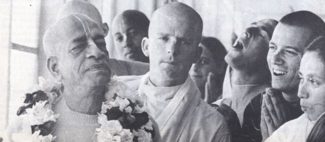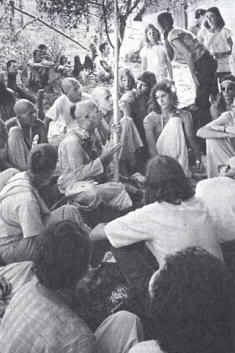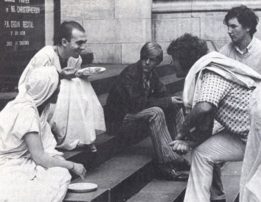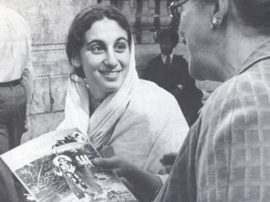The International Society for Krishna Consciousness (ISKCON) is a worldwide institution for the development of the spiritual culture necessary for a progressive human civilization. In the following interview, Dr. Stillson Judah discusses the philosophy and activities of ISKCON with one of the Society's leaders, Karandhara dasa Adhikari, who is a personal secretary to ISKCON's founder and spiritual master, His Divine Grace A.C. Bhaktivedanta Swami Prabhupada. Dr. Judah, a well-known theological scholar, author and lecturer, is Dean of the Graduate Theological Union in Berkeley, California, and is currently writing a book about the Hare Krsna movement.
Dr. Judah. Is it worth it to have the Vedic culture transplanted to America?

Karandhara. Well, of course, it is not possible to reinstitute the Vedic culture in this day and age. That is not what we are attempting. That would be a fanatical endeavor. Rather, we are simply trying to introduce the sankirtana movement. This congregational chanting of the Hare Krsna mantra, like we are doing, was introduced by Lord Caitanya. Lord Caitanya did not place much emphasis on the Vedic varnasrama-dharma or the brahminical caste system or anything like that. No. Regardless of one's position or sectarian designation or color or creed, He simply invited everyone to join in chanting the holy names of God. But as a helpful enhancement to our spiritual culture, we try to apply the principles of Vedic culture. These principles, namely cleanliness, austerity, truthfulness and mercy, are declared in the Srimad-Bhagavatam as universal principles for a spiritual culture. There is no question of sectarian dogma. These are operating principles of religiosity. Cleanliness taking baths; austerity limiting the eating, sleeping, and sex life. This is spiritual culture to apply these principles. According to time and place, there may be different applications called for. The varnasrama-dharma is the scientific Vedic system for social and spiritual development within society. It is very scientific, but it is not possible in this age to reinstitute. So, rather, we try to engage everyone in chanting the holy names of God and then attempt to apply the principles as much as practically possible.
Q. What particular vehicle or activity for you is most important? Is it chanting, sankirtana [chanting] on the streets, going to aratrika [a temple ceremony] or japa [chanting on beads]?
A. The chanting. Either out loud or japa. That is most important. That is the gift of Lord Caitanya. He delivered this chanting process. So of all gifts, this is the most sublime. Therefore Lord Caitanya is called the most magnanimous person. He has given what no one else has given ever He has given love of Krsna. And the way He has given us love of Krsna is through this chanting. This will deliver love of God.
Q. Is it more important to chant on your own or with devotees?
A. Chanting with devotees becomes super-potent. Just like if you want to learn science, if you want to learn biology, what is more conducive to gather with biology scholars and study in their association or to study by oneself? Studying by oneself may not exclude you from understanding biology, but it will be far more easy, generally, to join the association of other students. Chanting in association is far more potent. So if it is a helpful thing, why should we reject it? Rupa Gosvami recommends that one should take the association of devotees.
Q. How important is it to witness to others, to witness as a devotee?
A. It is one's duty. That is simple compassion. That is not a question of gauging values or morals; it is one's duty. It should be inspired out of compassion; when you see someone suffering, there should be some compassion. Why should we be heartless and cold? That is not human; that is animal. "Human" means compassionate. The actual self-realized soul sees everyone suffering. In any condition of life, young or old, rich or poor, everyone in the material world is suffering. Therefore one feels compassion. That is natural; that is human.
Q. How would you explain the benefits of living at the temple?
A. Well, of course, Krsna consciousness means just remembering Krsna, so living at the temple affords obvious advantages. There is very nice Deity worship in which Krsna is worshiped with all paraphernalia which is very pleasing to the eyes and to the ears. There are nice devotees they are cent per cent engaged in Krsna's service and a nice environment is created, a spiritual atmosphere. So it is very helpful for remembering Krsna. The idea is to remember Krsna.
Living in the temple may or may not be necessary. There is a story of Tagore, the poet. He was illiterate. He did not go to school, but he was a very great poet, so he won, at one time, an honorary degree from Oxford. Oxford is a very famous school, a difficult school to graduate from, and although Tagore never went to school, he won a degree from Oxford. But we should not think, "I shall sit, and I will also win a degree from Oxford." No, we must study very hard and take all the assistance we can. Just like you go to the store to buy books for help in an English course or some other course. You should take advantage of everything you can. Why reject? So coming to live in the temple is simply making the supreme step full-time. If one does not live in the temple, it does not mean exclusion from advancement. This process is open for everyone, everywhere, but if one can accept and take advantage of what is there, then why not? Otherwise, if there is some reason or other that one cannot, then no matter. Let him go on wherever he is, but the main thing is to remember Krsna.
Q. Is this the first time you have lived in a group situation like this? Could you compare it to any commune you have lived in?

A. Well, the communes are there, but they are never successful. What is a commune? Commune is simply a question of degree. I may have lived in a commune in the mountains, but before that I lived in a commune of the United States. Commune this, commune that it is simply a relative designation. We are communal in the universe, we are communal in the planet, we are communal in the state, we are communal in the city. None of those will be successful without Krsna consciousness. This is explained inIsopanisad: If something is God-centered, then that is its perfection. Any "ism" this "ism," that "ism," humanitarianism, altruism, communism, capitalism, whatever the "ism" if it is not God-centered, then it is worthless. If it is God-centered, it is perfect. So communists, capitalists, humanists, altruists, communalists if their consciousness is God-centered, then they will become perfect, and if it is not God-centered, they are doomed. You can extend that to society, to community, to race or to individual. Even your own individual existence will be doomed unless you can make it actually God-fixed, God-realized.
Q. I would like to know something about what goes on in the temple as far as how you would deal with people who are angry with each other.
A. This is the material world, and after all, the material world is always imperfect. In Krsna consciousness, we are not making some adjustment for the material world. There is no adjustment to make here. It is full of birth, death, pain, misery, discrepancy, faults and abominable things. So Krsna advises Arjuna in the Second Chapter of Bhagavad-gita, verse fourteen, that heat and cold, happiness and distress, appear and again pass, just as the sun comes up and then goes down. This you cannot stop. Therefore Krsna advises, "You must simply learn to tolerate." We have to deal with our faults, our material conditioning, not dwell on them too much. We have to be cognizant of them and do our best to overcome them, but we cannot make a program of fault-finding politics. So everyone works together as much as possible, and we try to overlook faults. There are sometimes, little quarrels, but that is to be expected. We should not mentally hover in foolish utopia. No. Rather, we should set our minds practically and do good work day by day, tolerating these ups and downs and imperfections of the material world.
Q. And by working and chanting together, people can overcome problems?
A. Yes, actually they will be gradually resolved. It is simply a question of becoming pure. As long as there is any impurity, there will be some conflict. So it is simply a question of becoming pure. Yes, that is the essence. When Krsna consciousness is developed, then everything else will be resolved. That is a fact.
Q. I would like to ask about the discipline and whether or not it has been difficult for you to give up mundane things.
A. Yes, there is some struggle. But it is not difficult. Krsna consciousness is very simple, so natural, but the difficulty arises because of our conditioned life. There is nothing difficult about drinking something very nectarean, but if our taste buds are poisoned and diseased, the nectar may taste sour. But by intelligence we should know that it is the disease which causes the bad taste. The nectar is actually very nice. I must become cured so that my diseased taste buds become accurate mediums of sensation. And that will become self-evident when I begin to actually relish the nectar as it is. So, yes, it requires some struggle, but Krsna is there. One has to act with faith in Krsna and be determined to overcome the impulses of the senses, the conditioning of the mind. InNectar of Devotion it says anything you want you have to pay for. And the price you have to pay for Krsna is your eagerness. If you will give Krsna all your eagerness, then you will purchase Krsna very easily, and your life will become sublime.
Q. How did you come to surrender?
A. Well, I came in contact with one boy who knew of the Krsna temple. Actually, at the time I met this boy, I was looking to find someplace to make God realization my full-time activity. I had resolved that there was nothing else to do. I had been through everything else. I was looking to find some spiritual atmosphere to seek the Absolute Truth. I had heard chanting of Hare Krsna, but I did not know anything of devotees or the philosophy. Simply that it was a mantra and that chanting was meditation. So I met this one boy, and he invited me: "Why don't you come and see this temple?" That was here in Los Angeles. So I came and spoke with the devotees, and I came again another day to attend the Sunday love feast. Then they invited me again, so I stayed a weekend. I became very much attracted by everything, mainly the devotees. I was gravitating toward the consciousness of the devotees "Birds of a feather flock together." I did not have much of a conception of what God was not much philosophical background but I had concluded that finding God was my only business in life. So when all of these people were living so wonderfully there in Krsna consciousness, and so welcoming, I became immediately attracted.
Q. Before you joined, were you committed to any other religious organization?
A. No, I was doing some yoga postures and silent meditation.
Q. That was not very fulfilling?
A. No, it was not very all-involving. You can do some yoga in the morning and some yoga in the evening, but then you have to spend the rest of the day doing nonsense.
Q. What kind of people join Krsna consciousness? Are there certain experiences you have to go through first?

A. Well, Bhagavad-gita says that there are four types of pious individuals who come to Krsna consciousness: the distressed; those in want of money, who want something but are unable to acquire it; the curious, who are intelligent and impartially seeking after truth; and those who actually want to find God, who intuitively understand that God realization is the purpose of life. These four kinds of individuals will come to Krsna consciousness. Other than that, there is no qualification. Anyone and everyone may take to this process. Lord Caitanya set this example: He accepted as His two closest disciples two social outcasts. They were originally Hindus, but they took the service of a Mohammedan Kazi, or magistrate. According to Hindu culture, if one takes the service of a Mohammedan, he is absolutely ostracized from Hindu society. So they were completely ostracized from Hindu society, and yet Lord Caitanya accepted them. They became Rupa Gosvami and Sanatana Gosvami. Thakura Haridasa was born in the family of a Mohammedan, and Lord Caitanya made him the namacarya, the teacher of the chanting of the holy name. So what it is all meant to say is that anyone of any race, of any creed, or of any background may become Krsna conscious, since in this age of Kali there is no qualification required. Simply if one will take to this chanting process, then his life will become perfect. Everyone is actually pure spirit soul; that is their real nature, their real essence. But they are covered by different degrees of material conditioning. Everyone is pure, everyone is brahman (spirit), but because of being covered by different modes and different combinations of modes of nature, they have lost the correct understanding of their real existence. So actually everyone is the kind of person to take to Krsna consciousness.
Q. How important is it for a person to become initiated?
A. Initiation means planting the seed. Before you plant the seed, you can till the soil very nicely and can make preparations to plant the seed, but if you do not plant the seed, there will be no crop. So we can till the soil for our spiritual development, and then the seed must be implanted. That means to come in contact with the spiritual master and accept him as your guru or teacher. That is planting the seed. Practically, without this there is no question of advancement.
Q. So there is no way a person can do it on his own unless he joins the movement?
A. Well, we should take it like that. Maybe there is an outside chance and maybe there is not, but why should we chance it? The idea is, as Rupa Gosvami says, that if you find Krsna consciousness somewhere, then do not shop purchase it immediately. You may never get the chance again for many lifetimes.
Q. I would I ike to ask about the future of Krsna consciousness. I think that it is one of the most important questions. What will you be doing, or don't you worry about those things?
A. Yes. Vaikuntha means "freedom from anxiety." Generally in the material world everyone is full of anxiety because he does not know what the future will bring and because his experience tells him that the future means ultimately death and doom. I have to face death, I have to face old age, I have to face disease, I have to face so many enemies, so many trials This is my predicament in the material world. I am forced to live in this way. So spiritual life, spiritual realization, means freedom from that anxiety. Free from anxiety, situated in Vaikuntha, one is not anxious about the future. Whatever the future brings we will accept quite willingly as long as we can remain Krsna conscious. Krsna is transcendental, and Krsna consciousness is transcendental, so when we are on the transcendental platform, fully linked with Krsna, we never mind about the future. The future is very bright because the future means the same as the present, which means absolute transcendental bliss, Krsna consciousness. It does not swerve, it does not change, it is not up and down or inebriating. Material pleasure means inebriation. In material life one is never completely satisfied or completely unsatisfied but rather in continuous teeter-totter duality. But Krsna consciousness means an absolute plane of happiness and bliss. So there is no necessity for being too much concerned with the future.
Q. Would you like to express some kind of goal in Krsna consciousness?
A. Yes, our goal is to spread Krsna consciousness to every town and village through whatever medium is expedient. To spread Krsna consciousness that is our goal. Therefore, we have formed a society and have established temples. We invite everyone to come and take part in the same activities we are taking part in, the life of culturing Krsna consciousness. This is the missionary spirit of the International Society for Krishna Consciousness. Because we have only started a short time ago, the ramifications of the society may not be yet evident. We, one thousand devotees, are occupying a few buildings only, so where is the question of society? But we are growing very fast, and the hope is to make the present world society Krsna conscious. We are not trying to become a sub-society or a different society. We are not living somewhere away from everyone else. We are living right in the midst of society. We want to make every society Krsna conscious. Then you will still have marketplaces, you will still have merchant houses, you will still have everything, but they will all become Krsna conscious. So that is our work. Somehow or other, we are attempting to infuse Krsna consciousness into every town and village. In this way, we are scheming and working day and night.
Q. What about affiliating with other organizations? Is it possible?
A. Well, if anyone sincerely wants to take to Krsna consciousness, he automatically affiliates. We are not interested in corporate merge or big political allies. If you want to take part in this chanting process, you are affiliated.
Q. You do not think that making affiliations will aid in spreading the movement?

A. Well, just like if you want to recruit doctors to help cure a disease, if they are not qualified doctors or are themselves contaminated with the disease, what good will they do? So quality is more important than quantity. One actual Krsna conscious pure devotee is better than one million churches, one million rituals, or one million affiliations because without that one perfect example, all the precepts and formularies have absolutely no value. They are worthless. William James pointed this out very explicitly that without practical example, all precept is worthless. That is a fact. You may say anything, but if there is no example of that, it is meaningless. So one devotee can change the course of the whole world. We have seen this in history. Look at Lord Buddha, Lord Jesus Christ or other great saints and sages. They have changed courses of history. They may have led very humble and very unobtrusive lives, but simply because they were Krsna conscious they have changed the lives of millions, influencing and molding them so much. So one pure devotee, one Krsna conscious individual, can do more for society than all the big institutions, all the big buildings, all the money, all the humanitarian and philanthropic work. So if we do nothing else, if nothing more is produced by our whole work other than simply one person's becoming Krsna conscious, then we are a success. And no matter what else we do, develop or acquire, if we do not become Krsna conscious, then everything is a failure. It will all amount to zero.
Q. What change in political leaders would you make? How would you go about that? Would you expect them to join a temple or anything like that?
A. Yes, why not? Join the temple or not join the temple, the idea is to somehow or other take to Krsna consciousness. Even if you just accept it intellectually, that is very good. Just that intellectual acceptance is almost liberation. This Krsna consciousness is actually the real meaning of life, and unless we are aware of this fact, how will we do any good to ourselves or others as political leaders or whatever? We are prepared to take political seats. We are not vying after power or some tyrannical machine. No. But whatever medium will help us spread Krsna consciousness we can accept. Basically, we simply want the political leaders to be enlightened in Krsna consciousness. They will then be able to render the highest service to the people.
Q. So that would mean that you would use television to propagate Krsna consciousness?
A. Oh, yes. As you see, we have automobiles, tape recorders, television all the modern inventions. Renunciation does not mean to give up something and refuse to utilize it. This may be a popular conception of renunciation, but it is second class. Krsna explains to Arjuna in Bhagavad-gita what real renunciation means. In the Eighteenth Chapter you will read all about real renunciation. Real renunciation means acting without attachment and surrendering all the fruits of our endeavors to Krsna. Actually, we have nothing to renounce. Just like a teller thinking that he will renounce the ownership of all the money in the bank; if the money does not belong to him in the first place, then where is the question of renouncing it. His proposal to renounce the money is simply foolishness. Similarly, we should know that nothing in this material world belongs to us. We may sit and pretend; we can play a game: "I own Boardwalk, I own Park Place." But we do not own those places; it is all a game. Similarly, we may say, "This is mine, and I am giving this up," but that is simply a game. We do not own it. So real renunciation means renouncing that conception of accepting or rejecting on our own behalf. Whatever we can accept on Krsna's behalf we will accept. Whatever we need to reject on Krsna's behalf we reject. That is our platform. Krsna is the proprietor of everything. God owns everything. We are simply His servants. Every implement we have, every item, every energy, we should use for Krsna's pleasure, and here within the International Society for Krishna Consciousness, you see the attempt of making a practical demonstration of just that. Here you see talents, propensities, money, time everything that everyone else is using we are also using, but we are attempting to use it in Krsna's service, acknowledging that that is its rightful purpose.
Q. So do you have any idea what structure your society will have in the future?

A. If we do not take to Krsna consciousness, the structure will be hell. The structure will be animal life more and more animalistic. Animal means always suspicious, animal means always cruel, animal means simply one-mindedness, i.e., "sense enjoyment for me." So that is coming more and more. By the influence of the age of Kali, everything is becoming more and more degraded less intelligence, less mercy, less sensibility, less rationality, less human qualities. They are all diminishing to a point of gross animal life. Just like a rat a rat has no altruistic, philanthropic or compassionate nature. When a rat is too hungry, it eats its own child, its own mate. And the only relationship the rat has with other rats is simply sex ten times, twenty times daily. There is no other social structure. Sex with anyone its mother, its child, anyone. That is rat life. This is the plight of human society. They will first of all destroy everything to eat, then they will eat each other. This may sound morbid, but it is actually foretold in Srimad-Bhagavatam. And it is developing; it is coming about. You may take note that unless human society takes to Krsna consciousness, there is no hope.
Q. So this is like an alternative?
A. No, not even an alternative. "Alternative" means you have a choice. There is no choice. You are either Krsna conscious or finished.
Q. Anyone who is not in the movement is finished?
A. Yes. "In the movement" means becoming God conscious. We are not so sectarian. "In the movement" means becoming Krsna conscious.
Q. What about someone like Mahatma Gandhi?
A. Mahatma Gandhi? Well, there are various degrees of piety and religiosity. But the very first principle that we must understand in real spiritual science is the difference between the self and body. If someone is not teaching the difference between the self and the body, he is not delivering spiritual science. He may be virtuous in the sense that he may be very pious and moral. But if you do not separate the body from the self, then you are too much confused to have right judgment and right direction. There must be sound philosophy based on actual spiritual realization.
This perfect combination of sentiment and knowledge is available from the great learned sages, devotees and acaryas who are situated in pure Krsna consciousness. These individuals are the true benefactors of society. Materially conceived political or civil rights or any other movement will do us no good. We require to become Krsna conscious, nothing else. So we are not so much interested in mundane historical personalities; rather, we shall devote our time and energy to hearing and serving themahabhagavatas, the great devotees of the Lord. This Krsna consciousness is now being delivered in pure unalloyed form by His Divine Grace A.C. Bhaktivedanta Swami Prabhupada and, hopefully, purely transferred by his disciples. So in that way, it is here now, and anyone can take it. Lord Caitanya actually prophesied that in every town and village, He would appear, His name would be heard, and every individual would have the opportunity to receive His mercy. So now He is here. Everyone may take it very seriously, take the opportunity. Now the opportunity is at hand, so it should be grasped. The time is now. Otherwise we do not hear anything but nonsense leaders, nonsense religious mentors, nonsense politicians, rascals, cheaters, liars and thieves.
We are prepared to challenge anyone. If you cannot make the distinction between the body and soul, then you are simply a cheater. Everyone must understand that this is a transcendental science; it cannot be understood simply with the mind. It has nothing to do with anything material, so unless we reach that transcendental platform, all of our philosophy and all of our activity becomes useless because it remains material. It may be pious, it may be impious, it may be laudable, it may be abominable it still remains material.
Q. So what about a Jesus Freak who claims he has gotten it from Jesus?
A. One may chant any name of God. The Christians are also singing the glories of Lord Jesus, so that is also sankirtana (broadcasting the glories of the Lord). We do not recall seeing them on the streets until after we were taking to sankirtana, so they have also been inspired by Lord Caitanya's movement, and now they are doing the same thing. Of course, their application is a little less developed. Nonetheless, it still is very good. Just like the mathematical axiom two plus two equals four; that is truth anywhere you take it master's class or kindergarten class. It remains the same, but it can be applied on higher or lower levels. So also Krsna consciousness can be applied on higher or lower levels. So it is not that the master's degree class should look down on the first grade class: "Oh, they only know two plus two equals four. What nonsense." No. "Oh, very nice, yes." The idea is that if anyone is taking part in sankirtana or Krsna consciousness to any degree and in any proportion, that should always be encouraged. We should always try to perfect our Krsna consciousness and not simply be content with a lesser degree of purity, but we should never discourage whatever part is being cultured by someone else. They are taking to the street; they are also performing sacrifice. They are chanting the glories of Lord Jesus Christ and calling attention to His teaching. So that is something. We will have to see how long it will last. Its real value will be tested in due course.
Q. And as for yourselves?
A. We shall go on chanting Hare Krsna, Hare Krsna, Krsna Krsna, Hare Hare/ Hare Rama, Hare Rama, Rama Rama, Hare Hare.
